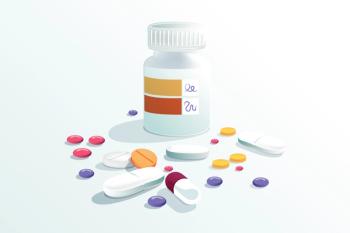
- MHE July 2021
- Volume 31
- Issue 7
2021 Starts Off Strong — and Controversial
Not in recent memory has an FDA approval stirred up so much controversy as the agency’s OK of Aduhelm, Biogen’s Alzheimer’s treatment.
As 2020 came to a close with 53 drug approvals, many wondered about 2021, questioning whether the drugs coming out of the pipeline would slow to a trickle. The answer, so far, is no. As of June 22, the FDA had approved 26 treatments compared with 24 at the same date last year.
The year began with the FDA’s emergency use authorization (EUA) on Feb. 27 for the Johnson & Johnson COVID-19 vaccine, the third such EUA after Pfizer received one for its vaccine on Dec. 11, 2020, and Moderna for its vaccine a week later.
But it has been a bumpy road for the J&J vaccine. Its rollout was paused after several cases of a rare disorder involving blood clots were reported. Hopes that the single-shot vaccine would push the vaccination rate up and thereby help the country achieve herd immunity have failed.
Still, as this issue went to press, the pandemic picture was brightening in the U.S. Just over 45% of the population was fully vaccinated, and the seven-day average of new cases of COVID-19 had dropped to just over 10,000, which is 20 times lower than the seven-day average of over 200,000 at the beginning of the year.
Despite concerns that drug approvals might lag because FDA resources would be pulled into reviewing COVID-19 vaccines and treatment, the 26 approvals so far this year tell another story. Among these approvals are some that have been long anticipated and others that have faced their fair share of controversy.
Alzheimer’s drug controversy
Easily the most controversial approval was handed to Biogen’s Aduhelm (aducanumab) for Alzheimer’s disease. On June 7, the monoclonal antibody became the first Alzheimer’s treatment approved in nearly two decades and the first that targets the beta-amyloid deposits believed by many to play a causative role in the disease. Aduhelm does not reverse Alzheimer’s but, according to the data on which the approval was based, may slow the rate of cognitive decline.
The approval by itself is significant because millions of Americans with Alzheimer’s may be prescribed the drug. But it may also send a fresh signal that beta-amyloid is a good target for Alzheimer’s treatment. Doubts about treating Alzheimer’s by reducing beta-amyloid deposits in the brain had started to creep in as other treatments that focused on beta-amyloid faltered in later-stage clinical trials.
However, in recent news, the FDA modified the recommended use, limiting it to patients with early-stage symptoms of Alzheimer's. As of July 9, FDA Acting Commissioner, Janet Woodcock,
In a letter made public to the Office of Inspector General of the Department of Health and Human Services, Woodcock wrote, "There continue to be concerns raised, however, regarding contacts between representatives from Biogen and FDA during the review process, including some that may have occurred outside of the formal correspondence process,” she wrote. “To the extent these concerns could undermine the public’s confidence in FDA’s decision, I believe that it is critical that the events at issue be reviewed by an independent body such as the Office of the Inspector General in order to determine whether any interactions that occurred between Biogen and the FDA review staff were inconsistent with FDA policies and procedures.”
The monoclonal antibody’s fate was unclear until the approval was announced. In 2019, Biogen and Eisai, which co-developed the drug, terminated two late-stage trials for the drug after an independent data monitoring committee determined that the treatment was unlikely to be successful. Based on re-analysis of the data from one of those trials, known as the EMERGE trial, the companies reversed course and applied for approval.
At the end of 2020, FDA staffers indicated they backed approval of the drug, but a panel of outside experts, the Peripheral and Central Nervous System Drugs Advisory Committee, effectively voted against approval. Three members of that committee have resigned to protest the FDA approval. Many are questioning the $56,000 price tag, which surpasses expectations and the Institute for Clinical and Economic Review’s cost-effectiveness price range of $11,000 to $23,100 if only the results from the favorable EMERGE trial are used. The FDA used the accelerated approval pathway to approve Aduhelm, which means Biogen must conduct a confirmatory clinical trial. Advisory committee members have told journalists that the FDA didn’t tell them about this possibility and that it occurred late in the process. If the positive results from the EMERGE trial don’t hold in the confirmatory trial, then the FDA could pull back its approval.
KRAS is “druggable” at last
An increasing number of cancer drugs, particularly those for non-small cell lung cancer, target mutations. But attempts to target mutations to the KRAS gene, which are among the most common, have failed and KRAS was deemed as possibly being “undruggable.” That changed on
May 28 with FDA’s approval of Amgen’s Lumakras (sotorasib). “The FDA approval of Lumakras is a breakthrough moment for patients with KRAS G12C-mutated non-small cell lung cancer because there is now a targeted therapy for this common, but previously elusive, mutation,” said David M. Reese, M.D., executive vice president of research and development at Amgen, in a press release when the drug received approval.
The approval stems from phase 2 trial data of 124 patients who received the treatment, 36% of whom had at least a 30% decrease in tumor size and 81% of whom responded positively to the treatment. Data presented at the American Society of Clinical Oncology’s annual meeting and reported simultaneously in The New England Journal of Medicine show that Lumakras may be especially effective in patients whose tumors have a co-mutation in the STK11 gene. Lumakras, which is taken daily as a pill, is being studied in a phase 3 trial, which will determine how the treatment shapes up against docetaxel.
At the same time, Amgen is testing a lower dose of Lumakras, resulting in some speculation about whether there were safety concerns from the FDA as it reviewed the drug. Amgen also faces questions regarding Lumakras’ $17,900 monthly price tag.
CAR-T cell therapy
Another major development during the first half of the year was the FDA’s approval of Bristol Myers Squibb’s and Bluebird bio’s Abecma (idecabtagene vicleucel) for the treatment of multiple myeloma on March 26. Abecma is a chimeric antigen receptor (CAR)-T cell therapy, and prior to this OK, the indications had been limited to acute lymphoblastic leukemia and several different types of lymphoma.
Abecma is approved for patients with relapsed or refractory multiple myeloma who have already received four previous treatments. In a phase 2 trial, the treatment was evaluated in 128 patients who had received at least three prior treatments. After 13.2 months, nearly 3 in 4 patients responded to treatment, and 1 in 3 had a complete response or better.
Jaime Rosenberg is a freelance medical writer based in Jersey City, New Jersey.
Articles in this issue
over 4 years ago
Adam Sabloff, VirtualHealth: "If You Don’t Quit, You’ll Win"over 4 years ago
Michael Zeglinski, OptumRx: Hitting the Right Notesover 4 years ago
The Busy Signal: Telehealth Deals Surge as Usage Stays Highover 4 years ago
Specialists are Testing the Value-based Care Watersover 4 years ago
Still the New Kids. But Growing Up Fast.Newsletter
Get the latest industry news, event updates, and more from Managed healthcare Executive.























